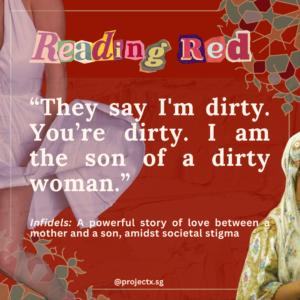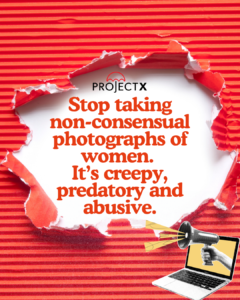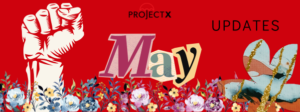(part one available here)
Julie, with Joe Chan, Centre Director of REACH Youth
The drugs gave Julie a sense of confidence and allowed her to stay up for entire days. Also, because of the vitality that the drugs gave her, Julie was able to continue her studies in the day while working the streets at night. However, the drugs also gave her a negative outlook on people, and the Erimin-5 causes her to have few memories of the happenings while she was under its influence.
Friends, that was Julie’s answer when asked about how she first came to know about the substances, “and I was curious about these things, how does it feel like, so I decided to try.
Oddly enough, it was the drugs that that provided the spark that led to Julie’s turn-around.
One day, while under the influence of drugs, Julie and her friend robbed a man in the red-light district, and beat him up. However, it was not until when she was in lock-up that she realised the gravity of the situation. Julie describes the moment, “I wasn’t aware of what I did….I woke up, I was inside the lock up already….because of the Epam, you don’t really remember what you did.”
And, not wanting to return to lock-up again, it was at that point of time that Julie decided that she wanted to stop taking drugs and working the streets. “I know I’m too young to go to prison and everything, and I don’t want to go to prison,” says Julie.

And from there, Julie began her road to recovery.
Becoming a better person
Julie tells us about the process in summary, “I stopped going back to the red light district. I stopped meeting my old friends, the bad friends who taught me about drugs. I stop doing a lot of things la, like going to club, like meeting my friends at night”
The steps taken were aplenty, and the change was not easy. But thankfully, Julie did not have to go at it alone.
As part of her police probation order, Julie was assigned to REACH Youth to be a part of the Youth Enhanced Supervision (YES) scheme, a 6-month rehabilitative program for first-time drug offenders aged 21 and below. There, she got to meet her social worker, Lee Hui Yi, who provided practical and emotional support along with the rest of Julie’s peers under the program.
In addition, as she had already moved back in with her family at the time of her arrest, Julie’s aunt was instrumental in her road to recovery. “She would lock the gates, wouldn’t let me go out at night. She controlled everything. And it worked,” Julie said. Although at the point of time Julie felt anger towards her aunt for her actions, but she soon realized the benefits of what her aunt was trying to do.
However, throughout Julie’s life as a woman, from the red-light district to where she is today, there was one person who Julie feels was there the entire way: Vanessa.
Vanessa and Project X
If we have problems, we’ll always run to Vanessa
~Julie, on Vanessa
The Vanessa that Julie referred to was none other than Vanessa Ho, Director of Project X, a sex workers’ rights organization in Singapore. Project X targets mainly Singaporean and Malaysian sex workers through outreach (both in the red light district and via online platforms), where members of the organization carry out acts such as distribute condoms and lubricants. But more importantly, through outreach, the organisation aims to listen to the problems and the issues plaguing the workers, and hopefully be able to find a solution for them or lessen the distress. In addition, the organization also runs a community center at their compound, where weekly events such as talks, legal workshops, and informal gatherings are held.
Julie talks about some of the things Vanessa and Project X have done for her, “They supply condoms….she bring us to meet these lawyers, so from there, we learn about law and everything. She teaches us a lot la.” In addition, while Julie was living a hotel after her flatmates’ arrest, Vanessa referred Julie to the T Project, an organization committed to empowering the transgender community in Singapore, for shelter until Julie’s aunt was willing to take her back in.
Julie first met Vanessa at an area frequented by transgender youths, back when she was around 15 or 16 years old. Vanessa recounts those moments, “She was very quiet…she was sitting at the back of a lorry with her friend. And so I approached her, I gave her some condoms, and then I just talked to her.”
“At that time I think she was very young, probably only 15 or 16 years old…and I was royally shocked. Not just for sex work, but for sexual relations…and the legal age for sex work was 18,” Vanessa adds.
And, when Julie decided to turn her life around, Vanessa was more than happy to help. “I think she was in and out of homelessness, and it was a particularly desperate point in her life, and that was when she came to us,” Vanessa shares, “she didn’t say she wanted to get out, but she said that it was too difficult…so I just used that, and I asked her to reflect upon what she thinks we can help her with.”
When Julie requested for a job, the 2 women sat down together and wrote a CV, consolidated her school transcripts, and mapped out her life goals with her. “She is the one who helped me to get my current job,” shared Julie.
“She has gone through some real difficulties…she’s really been through a lot for an 18-year old as of now. It truly is really unfair to her,” shared Vanessa when asked about what struck out to her about Julie, “I think the cards that life has dealt with her were really really just, probably the worst set of cards that I have ever seen…But she has found a way to survive.”
Transgender Women and the Sex Work Industry
“When I met her, she was the youngest. Definitely.”
~Vanessa, on Julie
According to Vanessa, cases of transgender female who like Julie, started work in the red-light district at a young age, are not tremendously common but are not rare either. She estimates that around 90% of Singaporean street-based sex workers are transgender women.
Vanessa attributes a lack of positive role models as a reason for this. “A lot of people tell us that there’s just no positive role models out there of transgender women being successful, leading a high-flyer life. You don’t see them in the newspapers, you don’t see them on TV,” says Vanessa, “if you do, you see them as drug dealers, you see them as loan shark runners, you see them hanging out in the night time. These are the images you grew up with, and you grow up and you say “that’s who I’m supposed to be”.” Vanessa continues, “so they start very young. Because that’s roughly the age when they really want to assert their individuality…They really want to just be who they are, to be an authentic version of themselves” And, as with many teenagers Julie’s age, their peers tend to be a contributing factor as well. Vanessa shares, ““when they ask “what do I do? How do I make money?” A lot of the elders will just say do sex work. You get instant cash. It’s not easy, but it’s fast. You get to save enough money for hormones, surgery, clothes, make up, and stuff to make yourself feel good.”
“It has become a rite of passage of many transgender women”
~Vanessa, on the reasons that transgender women enter the sex trade
Money and job discrimination are also recurring themes in the transgender women that Vanessa has worked with. However, sometimes, even with a good salary and a supportive work environment, they still run the risk of slipping into the industry. “At the end of the day, you feel like you are not with people that are like you. You want to be with people who can understand the struggles that you have been through. You want to be around people who know one hormone from another,” Vanessa explains, “you want to be able to have this kinds of conversations with people, because that is your day to day worry, that is your day to day life. So sometimes they fall back into the industry simply because that is where their friends”

Moreover, at times the money that these women earn from working the streets are for more than just to meet their physical and material needs. It is what they used to gain acceptance from their families. Vanessa shares more, “some transgender women still stay with their family. They have a home. In order to gain acceptance from their families, they give their families money…and because sex work can afford a higher salary…they have a lot to give…and so a lot of the acceptance from their family is actually predicated on that money. Without that money, they’d be on the streets. They’d be homeless. It’s almost as if they are buying their acceptance.”
On top of what Vanessa and Julie has shared about the dark side of the red-light district, these women further find themselves face-to-face with regular bouts of ridiculed, mockery, and judgement from members of the public. Vanessa gives an example, “there’s a popular nightspot…many people go there… and they would come in packs, usually 10, 15 people, usually all boys, maybe straggling one girl or two girls. And then maybe in a show of macho-ism of something, they would start screaming “eh bapok (malay for transgender, usually used in a degrading manner), yier why you like that one”. And they would say all these kinds of demeaning and degrading things, sometimes to the extent of throwing things at them…some would molest them and then run away, giggling, as if they have achieved something great.” She continues, “we actually managed to sit down with some of these boys and ask them why…what goes on in your mind when you are doing this to another human being. And they are just like, “no la, these people are doing wrong what. They deserved to be punished”.”
The mockery and ridicule does not stop there. According to Vanessa, it is also a contributing factor as to why the police tend to not be brought in when wrong is done to them. “We realised that a lot of sex workers, when they are doing this, they don’t dare to go to the police when things happen to them. They are afraid that if they go to the police, they would be ridiculed, they would be mocked, they would be turned away, or worst case scenario, they would be arrested themselves,” says Vanessa. In an effort to combat this, Project X came up with the Abuser Alert Programme, which helps sex workers who were victims of abuse or crimes against them, but are apprehensive about approaching the authorities. The Abuser Alert Programme helps such victims by recording down the incident as well as details of the perpetrator, after which the information is spread through their sources. This way, should the same perpetrator be encountered by another worker, he/she can make an informed decision about whether or not to take the person up as a client. The said recording can either be done in person, or through their website.
(End of Part 2. Stay tuned for Part 3…)
(part one available here)
—
Guest article by Jarren Lye. Jarren is currently in his third year at the National University of Singapore, majoring in Linguistics and Social Work. He is interested in social issues in Singapore, particularly those revolving around the LGBTQ+ community. He hopes to be able to utilise his writing skills as a platform raise awareness about the community and allow the voices of the marginalised to be heard. Jarren can be contacted at [email protected]






